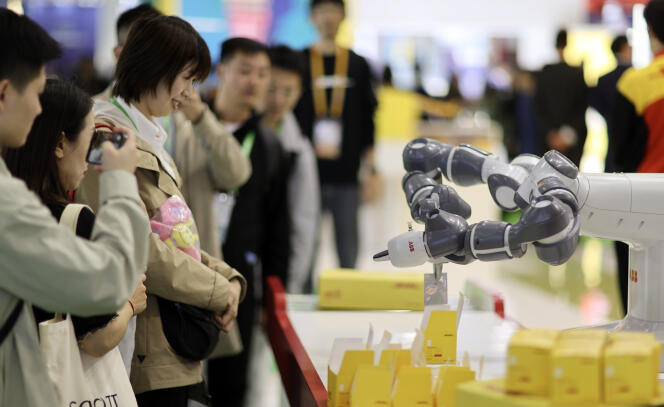


The space resembles as much a workshop as a factory. Plenty of shelves, a few test stations, three assembly lines, each one roughly 10 meters long. On large metal chests of drawers, white and green robotic arms grab screws and bolts and fit them onto parts. Welcome to CGXI, a 300-employee startup based in Wuxi, north of Shanghai, which manufactures "cobots" (a contraction of "robot" and "collaborative"), i.e., small industrial robots capable of working in collaboration with humans.
Here, robots manufacture robots. Paradoxically, the company has not yet achieved a high degree of automation, due to its small production volumes. But thanks to funding from a public investment bank, the startup is preparing to launch a new, fully automated factory, whose "3.0" industrial process will be optimized for larger-scale production.
The market is huge. By 2022, China will have deployed 290,000 industrial robots, more than half of all installations worldwide, according to the International Federation of Robotics (IFR). The China Electronics Institute expects the market is to be worth $11.5 billion (around €10.7 billion) by 2024.
The rapid automation of factories reflects a major transition. With the working-age population declining since 2010 and wages on the rise, the Middle Kingdom is no longer as attractive to multinationals in search of cheap labor. To remain the world's factory, it needs to move upmarket.
The authorities are well aware of this. As a result, dozens of support plans have been launched at both central and local levels. As early as 2015, Guangdong, a major industrial province in south-east China, adopted a 950-billion-yuan (€123 billion) plan to "replace humans with robots." This determination has not wavered. In early 2023, the central government published a "Robot+ action plan" aimed at developing automation in most economic sectors, from industry to agriculture and healthcare.
With 322 robots per 10,000 workers, China is the fifth best-equipped country in the world, behind South Korea (1,000 per 10,000), Singapore, Japan and Germany, but ahead of the USA (272 per 10,000) and France. This equipment rate is particularly surprising given that labor costs remain much lower in China.
There is no question of letting the benefits of these investments evaporate abroad. Since the Made in China 2025 plan, launched in 2015, Beijing has also been aiming to replace imported robots with Chinese technology. Local manufacturers have since more than doubled their market share, from 17.5% in 2015 to 35.5% in 2022, according to MIR Databank.
You have 60% of this article left to read. The rest is for subscribers only.
